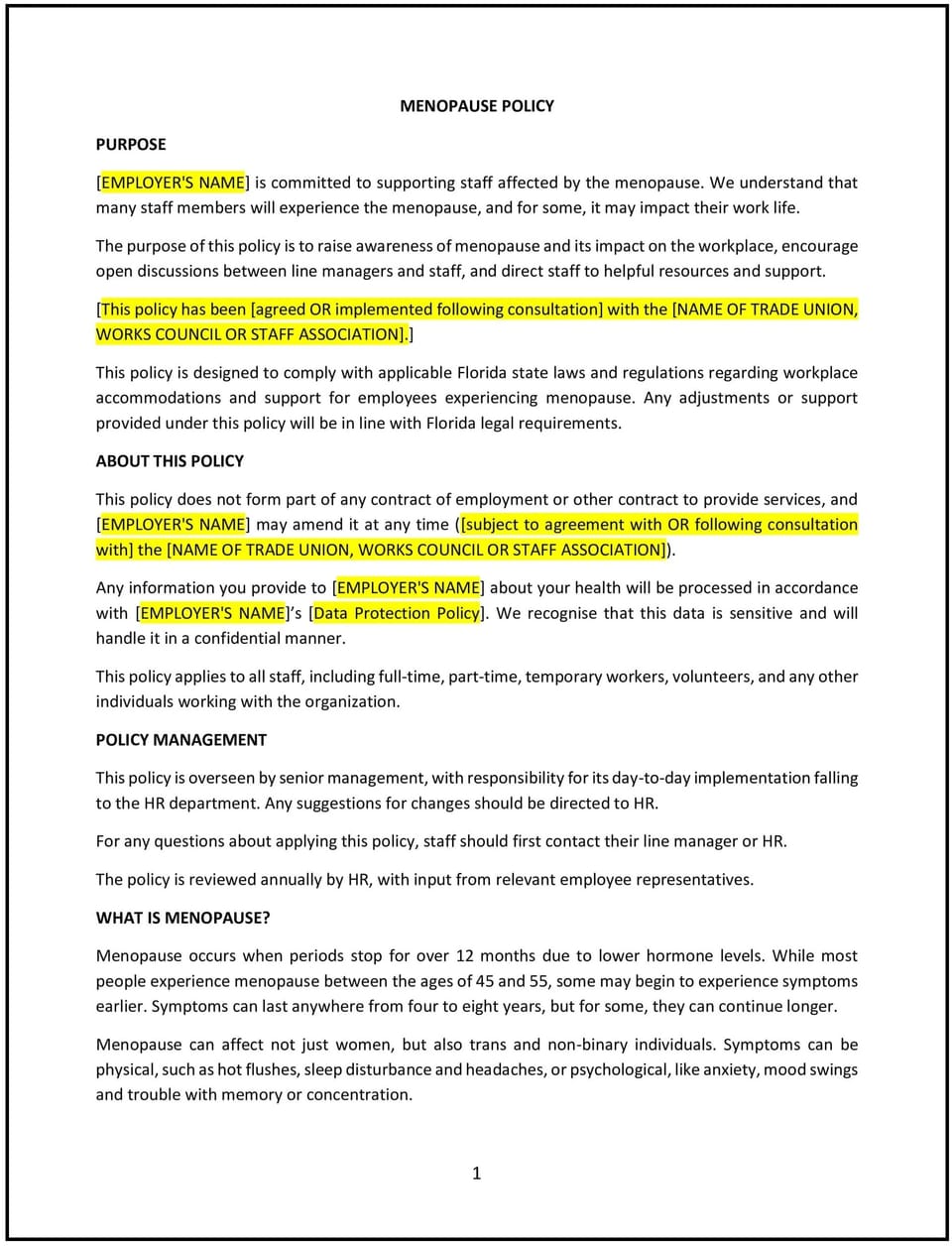Menopause policy (Free template): Free template

Menopause policy (Florida)
A menopause policy helps Florida businesses support employees experiencing menopause by providing time off, accommodations, and resources. This policy outlines procedures for addressing menopause-related needs, promoting inclusivity, and fostering a supportive workplace environment. It is designed to promote employee well-being, reduce stress, and provide clear guidelines for managing menopause in the workplace.
By implementing this policy, businesses in Florida can demonstrate their commitment to inclusivity, enhance employee satisfaction, and align with the state’s focus on supporting the health and well-being of all employees.
How to use this menopause policy (Florida)
- Define eligible employees: Clearly specify which employees qualify for support under this policy, such as those experiencing menopause symptoms.
- Establish request procedures: Outline how employees should notify the business of their menopause-related needs, including whom to contact and how to document requests.
- Address accommodations: Specify the types of accommodations the business will offer, such as flexible schedules, modified workstations, or access to cooling facilities.
- Provide support resources: Offer information about employee assistance programs (EAPs), counseling services, or local resources for support.
- Communicate the policy: Share the policy with employees during onboarding and through regular communications to ensure awareness and understanding.
- Monitor adherence: Regularly review how the policy is applied and address any concerns or discrepancies promptly.
- Update the policy: Periodically assess the policy to reflect changes in workplace dynamics, employee needs, or business goals.
Benefits of using this menopause policy (Florida)
This policy offers several advantages for Florida businesses:
- Promotes inclusivity: Supporting employees experiencing menopause fosters a diverse and welcoming workplace culture.
- Reduces stress: Providing accommodations and resources helps employees manage menopause symptoms without added work-related pressure.
- Builds trust: A clear policy demonstrates the business’s commitment to fairness and employee well-being.
- Aligns with community values: Reflects Florida’s emphasis on inclusivity, diversity, and mutual support.
- Enhances reputation: Demonstrates the business’s dedication to ethical practices and employee well-being.
- Improves retention: Offering support contributes to higher employee satisfaction and loyalty.
- Supports growth: A robust policy facilitates a more engaged and productive workforce.
Tips for using this menopause policy (Florida)
- Communicate clearly: Ensure employees understand the policy by providing written materials and discussing it during meetings or training sessions.
- Train managers: Educate supervisors on how to handle menopause-related requests sensitively and consistently.
- Be flexible: Allow for reasonable accommodations, such as flexible schedules or modified workstations, to support employees during menopause.
- Track requests: Maintain records of menopause-related requests and approvals to monitor trends and ensure fairness.
- Stay informed: Keep up with changes in societal norms, workplace expectations, or best practices related to menopause support.
- Encourage feedback: Solicit input from employees to identify areas for improvement and ensure the policy meets their needs.
- Review periodically: Assess the policy’s effectiveness and make updates as needed to reflect changes in workplace dynamics or business goals.
Q: Why should Florida businesses adopt a menopause policy?
A: Businesses should adopt this policy to promote inclusivity, reduce stress, and demonstrate their commitment to supporting employees experiencing menopause.
Q: What types of accommodations should businesses consider?
A: Businesses should consider accommodations such as flexible schedules, modified workstations, access to cooling facilities, and modified workloads.
Q: How should businesses handle requests for menopause-related accommodations?
A: Businesses should evaluate requests based on individual needs and job requirements, ensuring accommodations are reasonable and effective.
Q: What support resources should businesses provide?
A: Businesses should offer access to counseling services, EAPs, or local resources for support, ensuring employees have the necessary resources to manage menopause symptoms.
Q: How can businesses ensure fairness in accommodating menopause-related needs?
A: Businesses should treat all requests for accommodations consistently, ensuring that decisions are based on individual needs and job requirements.
Q: Should businesses provide training on menopause?
A: Businesses should provide training to managers and staff on menopause, inclusivity, and respectful communication to foster a supportive workplace culture.
Q: How often should businesses review the policy?
A: Businesses should review the policy annually or whenever there are significant changes in workplace dynamics, employee needs, or business operations.
This article contains general legal information and does not contain legal advice. Cobrief is not a law firm or a substitute for an attorney or law firm. The law is complex and changes often. For legal advice, please ask a lawyer.


